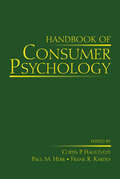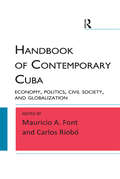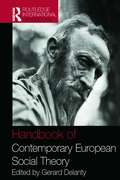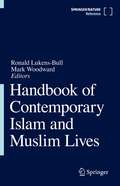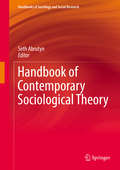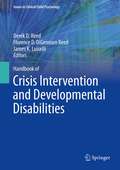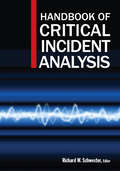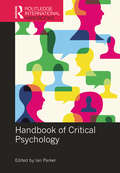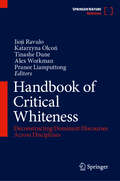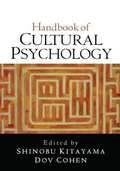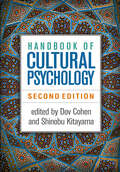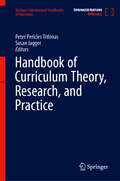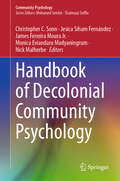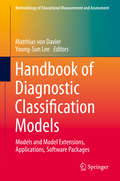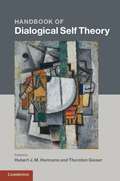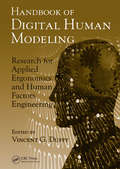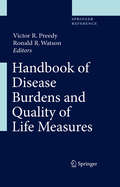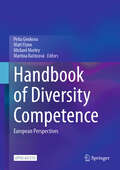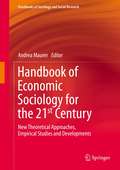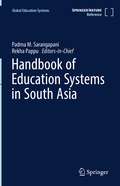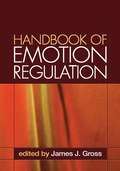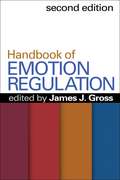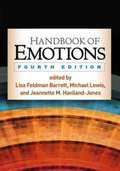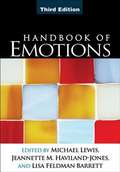- Table View
- List View
Handbook of Consumer Psychology (Marketing and Consumer Psychology Series)
by Curtis P. Haugtvedt Paul M. Herr Frank R. KardesThis Handbook contains a unique collection of chapters written by the world's leading researchers in the dynamic field of consumer psychology. Although these researchers are housed in different academic departments (ie. marketing, psychology, advertising, communications) all have the common goal of attaining a better scientific understanding of cognitive, affective, and behavioral responses to products and services, the marketing of these products and services, and societal and ethical concerns associated with marketing processes. Consumer psychology is a discipline at the interface of marketing, advertising and psychology. The research in this area focuses on fundamental psychological processes as well as on issues associated with the use of theoretical principles in applied contexts. The Handbook presents state-of-the-art research as well as providing a place for authors to put forward suggestions for future research and practice. The Handbook is most appropriate for graduate level courses in marketing, psychology, communications, consumer behavior and advertising.
Handbook of Contemporary Cuba: Economy, Politics, Civil Society, and Globalization
by Carlos Riobo Mauricio A. FontCuban studies is a highly dynamic field shaped by the country's distinctive political and economic circumstances. Mauricio A. Font and Carlos Riobo offer an up-to-date and comprehensive survey offering the latest research available from a broad array of disciplines and perspectives. The Handbook of Contemporary Cuba brings contributions from leading scholars from the United States, Cuba, Europe, and other world regions and introduces the reader to the key literature in the field in relation to rapidly changing events on the island and in global political and economic affairs. It also addresses timely developments in Cuban civil society and human rights. The guide also presents economic models and forecasts as well as analyses of the recent, pivotal Sixth Congress of the Communist Party of Cuba. For students, scholars, and experts in government, it is a vital addition to any collection on Latin American studies or global politics.
Handbook of Contemporary European Social Theory
by Gerard DelantyThis innovative publication maps out the broad and interdisciplinary field of contemporary European social theory. It covers sociological theory, the wider theoretical traditions in the social sciences including cultural and political theory, anthropological theory, social philosophy and social thought in the broadest sense of the term. This volume surveys the classical heritage, the major national traditions and the fate of social theory in a post-national and post-disciplinary era. It also identifies what is distinctive about European social theory in terms of themes and traditions. It is divided into five parts: disciplinary traditions, national traditions, major schools, key themes and the reception of European social theory in American and Asia. Thirty-five contributors from nineteen countries across Europe, Russia, the Americas and Asian Pacific have been commissioned to utilize the most up-to-date research available to provide a critical, international analysis of their area of expertise. Overall, this is an indispensable book for students, teachers and researchers in sociology, cultural studies, politics, philosophy and human geography and will set the tone for future research in the social sciences.
Handbook of Contemporary Islam and Muslim Lives
by Mark Woodward Ronald Lukens-BullThis is a comprehensive handbook which for the first time provides a general yet detailed discussion of contemporary Islam and various aspects of Muslim lives. It offers a much needed tool for an introduction to the world of contemporary Muslim life and debate, and a link of continuity between the Muslim world and Muslims living and born in the West. The reader gains access to articles by leading scholars who observe phenomena in a post-9/11 context and from a global viewpoint. The topics have been carefully selected to provide the reader with both the necessary general view that a good handbook must offer while presenting details and information, as well as ethnographic examples, to inspire further research and interest. Indeed, each chapter will offer topical reading suggestions from which one can expand the material discussed in the chapter. The approach of the handbook is mainly social-anthropological, but attention is given to other disciplines like history, geography, political studies, as well as gender studies and cultural studies.
Handbook of Contemporary Sociological Theory
by Seth AbrutynThis Handbook provides the hidden common threads that tie sociological inquiry together and featuring eminent scholars, it separates itself from its predecessors in substance and organization. Rather than rehashing old debates or longingly gazing at the past, this book presents sociologists with new ways of conceptualizing the organization and presentation of sociological theory. At the heart of this Handbook's vision is the twin goals of making theory a viable enterprise by reconceptualizing how we teach theory and keeping theory closely tied to its empirical applications. Three strategies are offered: (1) Elucidating how classic issues like integration or interaction are interrogated today; (2) Presenting a coherent vision of the social levels of reality that theorists work on such as communities, groups, and the self as well as how the coherence of these levels speaks to the macro-micro link; and, (3) Theorizing the social world rather than celebrating theorists or theories; that is, one can look at how theory is used holistically to understand the constraints the social world places on our lived experience or the dynamics of social change. Hence, in the second decade of the 21st century, it has become clear that sociology is at a crossroads as the number of theorists and amount of theory available is increasingly unmanageable and unknowable by the vast majority of professionals and students. As such, this Handbook of Contemporary Sociological Theory presents the novice and the expert with the a roadmap for traversing this crossroad and building a more coherent, robust, and cumulative sociology.
Handbook of Crisis Intervention and Developmental Disabilities
by James K. Luiselli Derek D. Reed Florence D. DiGennaro ReedThe Handbook of Crisis Intervention and Developmental Disabilities synthesizes a substantive range of evidence-based research on clinical treatments as well as organizational processes and policy. This comprehensive resource examines the concept of behavioral crisis in children and adults with special needs and provides a data-rich trove of research-into-practice findings. Emphasizing continuum-of-care options and evidence-based best practices, the volume examines crisis interventions across diverse treatment settings, including public and private schools, nonacademic residential settings as well as outpatient and home-based programs. Key coverage includes: Assessment of problem behaviors.Co-occurring psychiatric disorders in individuals with intellectual disabilities.Family members' involvement in prevention and intervention.Intensive treatment in pediatric feeding disorders.Therapeutic restraint and protective holding.Effective evaluation of psychotropic drug effects. The Handbook of Crisis Intervention and Developmental Disabilities is a must-have resource for researchers, scientist-practitioners, and graduate students in clinical child, school, developmental, and counseling psychology, clinical social work, behavior therapy/analysis, and special education as well as other related professionals working across a continuum of service delivery settings.
Handbook of Critical Incident Analysis
by Richard W SchwesterCritical incidents all too often explode onto the social conscious and challenge our sense of security. This comprehensive handbook brings together a range of experts who provide a foundation for the field of critical incident analysis by examining specific incidents9/11, the Virginia Tech massacre, the H1N1 pandemic, the BP oil spill, and more--through various methodological and disciplinary lenses.
Handbook of Critical Psychology (Routledge International Handbooks)
by Ian ParkerChoice Recommended Read Critical psychology has developed over time from different standpoints, and in different cultural contexts, embracing a variety of perspectives. This cutting-edge and comprehensive handbook values and reflects this diversity of approaches to critical psychology today, providing a definitive state-of-the-art account of the field and an opening to the lines of argument that will take it forward in the years to come. The individual chapters by leading and emerging scholars plot the development of a critical perspective on different elements of the host discipline of psychology. The book begins by systematically addressing each separate specialist area of psychology, before going on to consider how aspects of critical psychology transcend the divisions that mark the discipline. The final part of the volume explores the variety of cultural and political standpoints that have made critical psychology such a vibrant contested terrain of debate. The Handbook of Critical Psychology represents a key resource for researchers and practitioners across all relevant disciplines. It will be of particular interest to students and researchers in psychology, psychosocial studies, sociology, social anthropology and cultural studies, and to discourse analysts of different traditions, including those in critical linguistics and political theory.
Handbook of Critical Whiteness: Deconstructing Dominant Discourses Across Disciplines
by Pranee Liamputtong Tinashe Dune Jioji Ravulo Alex Workman Katarzyna OlcońThis timely handbook responds to the international drive to know more about Whiteness – its origins, its impacts and, importantly, the means for diffusing it. Guided by critical Whiteness theory, the volume deconstructs, decodes and disrupts Whiteness as it is constructed and employed in contemporary and diverse contexts. To do so, the international contributors discuss and critique the role of 21st-century Whiteness across a range of professions and disciplines relevant to the needs of contemporary global citizens. Failure to deconstruct Whiteness as an ideology and the power structure underlying national and global racial inequalities undermines the efforts to improve social, health and economic outcomes for societies and nations on a grand scale. The handbook is comprehensive in its nature and contents, with 10 themed parts ranging from a more disciplinary-based approach, theoretical frameworks, and methodological frameworks, to different aspects of decolonized approaches to social, health, political and economic well-being. It navigates how various disciplines respond to the pervasive and persuasive nature of Whiteness in their operational settings, across individual, professional, organisational and systemic levels. The volume is unique in its dual focus on deconstructing Whiteness and providing examples and recommendations on how diverse groups seek to decolonize their communities and people through action. Examples and recommendations are discussed with particular focus on: 1) the interconnection between integrating indigenous and diverse knowledges and perspectives in deconstructing Whiteness; 2) the urgency for critical Whiteness discourse, dialogue and professional development across disciplines; and 3) institutional accountability to decolonisation and anti-racism. Considering the ongoing marginalization and institutional racism directed at non-White individuals and communities and the rise of White supremacy movements, critical Whiteness pedagogy and research is more important than ever. Handbook of Critical Whiteness: Deconstructing Dominant Discourses Across Disciplines is an essential resource for students, educators, academics, researchers, higher education administrators, practitioners, policy-makers, organisational leaders, government stakeholders, and other professionals in social sciences, medicine, STEM, allied/global/public health, legal and political disciplines, and health and social care institutions. It especially engages those interested in decolonisation, critical race theory, critical Whiteness theory, critical multiculturalism, social justice, anti-racism and Indigenous knowledges.
Handbook of Cultural Psychology
by Shinobu Kitayama Dov CohenBringing together leading authorities, this definitive handbook provides a comprehensive review of the field of cultural psychology. Major theoretical perspectives are explained, and methodological issues and challenges are discussed. The volume examines how topics fundamental to psychology-identity and social relations, the self, cognition, emotion and motivation, and development-are influenced by cultural meanings and practices. It also presents cutting-edge work on the psychological and evolutionary underpinnings of cultural stability and change. In all, more than 60 contributors have written over 30 chapters covering such diverse areas as food, love, religion, intelligence, language, attachment, narratives, and work.
Handbook of Cultural Psychology, Second Edition
by Shinobu Kitayama Dov CohenNow completely revised (over 90% new), this handbook offers the authoritative presentation of theories, methods, and applications in the dynamic field of cultural psychology. Leading scholars review state-of-the-art empirical research on how culture affects nearly every aspect of human functioning. The volume examines how topics fundamental to psychology--such as cognition, emotion, motivation, development, and mental health--are influenced by cultural meanings and practices. It also addresses the psychological and evolutionary underpinnings of cultural stability and change. The second edition reflects important advances in cultural neuroscience and an increasing emphasis on application, among many other changes. As a special bonus, purchasers of the second edition can download a supplemental e-book featuring several notable, highly cited chapters from the first edition. New to This Edition: *Most chapters are new, reflecting nearly a decade of theoretical and methodological developments. *Cutting-edge perspectives on culture and biology, including innovative neuroscientific and biopsychological research. *Section on economic behavior, with new topics including money, negotiation, consumer behavior, and innovation. *Section on the expansion of cultural approaches into religion, social class, subcultures, and race. *Reflects the growth of real-world applications in such areas as cultural learning and adjustment, health and well-being, and terrorism.
Handbook of Curriculum Theory, Research, and Practice (Springer International Handbooks of Education)
by Peter Pericles Trifonas Susan JaggerThis Handbook paints a portrait of what the international field of curriculum entails in theory, research and practice. It represents the field accurately and comprehensively by preserving the individual voices of curriculum theorist, researchers and practitioners in relation to the ideas, rules, and principles that have evolved out of the history of curriculum as theory, research and practice dealing with specific and general issues. Due to its approach to both specific and general curriculum issues, the chapters in this volume vary with respect to scope. Some engage the purposes and politics of schooling in general. Others focus on particular topics such as evaluation, the use of instructional objectives, or curriculum integration. They illustrate recurrent themes and historical antecedents and the curricular debates arising from and grounded in epistemological traditions. Furthermore, the issues raised in the handbook cut across a variety of subject areas and levels of educationand how curricular research and practice have developed over time. This includes the epistemological foundations of dominant ideas in the field around theory, research and practice that have led to marginalization based on race, class, gender, sexuality, ethnicity, age, religion, and ability. The book argues that basic curriculum issues extend well beyond schooling to include the concerns of anyone interested in how people come to acquire the knowledge, skills, and values that they do in relation to subjectivity and experience.
Handbook of Decolonial Community Psychology (Community Psychology)
by Christopher C. Sonn James Ferreira Moura Jr. Jesica Siham Fernández Nick Malherbe Monica Eviandaru MadyaningrumThis handbook offers refined interpretations of decolonial thought, methodologies, and practices in community psychology. As a representative mapping of the broad range of decolonial cosmovisions, experiences, and praxes in community psychology and allied disciplines around the globe, it brings together contributions from North America, Latin America, Europe, Oceania, Africa, and Asia. It offers an overview of community psychology with a decolonial focus and from a transnational perspective, transcending intellectual, geographical, and cultural borders, and constraining identities, affirming and celebrating the unique identities, experiences, and positions of its contributors within the global landscape of knowledge and politics. The handbook illuminates the dynamic intersections between resistance and colonial legacies, foregrounding the enduring struggles against settler colonialism and racial capitalism across diverse geographies, temporalities, and histories. Underscoring the urgency of addressing inter-connected local and global challenges, such as land rights, livelihoods, and dignified existence, it offers hopeful yet critical perspectives on radical social justice struggles around the globe. The volume brings together contributions from scholars, academics, educators, researchers, practitioners, activists, and community collaborators, and its chapters range in style and format. Some are more aligned with academic writing, while others - in the spirit of decolonizing disciplinary logics - are structured through more undisciplined, less constrained writing forms. Each author was invited to question the coloniality of power in and beyond community psychology. As such, the handbook contains productions that trouble the manifestations of coloniality both in the past and in the present, as well as in the different territories of the Majority World, particularly within settler colonial nation-states. As a seminal work, the Handbook of Decolonial Community Psychology will further define and shape the contours of knowledge in decolonial community psychology, and inspire new generations of scholars, practitioners, students, and community organizers to advance the field with innovative ideas and transformative practices.
Handbook of Diagnostic Classification Models: Models and Model Extensions, Applications, Software Packages (Methodology of Educational Measurement and Assessment)
by Matthias Von Davier Young-Sun LeeThis handbook provides an overview of major developments around diagnostic classification models (DCMs) with regard to modeling, estimation, model checking, scoring, and applications. It brings together not only the current state of the art, but also the theoretical background and models developed for diagnostic classification. The handbook also offers applications and special topics and practical guidelines how to plan and conduct research studies with the help of DCMs. Commonly used models in educational measurement and psychometrics typically assume a single latent trait or at best a small number of latent variables that are aimed at describing individual differences in observed behavior. While this allows simple rankings of test takers along one or a few dimensions, it does not provide a detailed picture of strengths and weaknesses when assessing complex cognitive skills. DCMs, on the other hand, allow the evaluation of test taker performance relative to a potentially large number of skill domains. Most diagnostic models provide a binary mastery/non-mastery classification for each of the assumed test taker attributes representing these skill domains. Attribute profiles can be used for formative decisions as well as for summative purposes, for example in a multiple cut-off procedure that requires mastery on at least a certain subset of skills. The number of DCMs discussed in the literature and applied to a variety of assessment data has been increasing over the past decades, and their appeal to researchers and practitioners alike continues to grow. These models have been used in English language assessment, international large scale assessments, and for feedback for practice exams in preparation of college admission testing, just to name a few. Nowadays, technology-based assessments provide increasingly rich data on a multitude of skills and allow collection of data with respect to multiple types of behaviors. Diagnostic models can be understood as an ideal match for these types of data collections to provide more in-depth information about test taker skills and behavioral tendencies.
Handbook of Dialogical Self Theory
by Hubert J. Hermans Thorsten GieserIn a boundary-crossing and globalizing world, the personal and social positions in self and identity become increasingly dense, heterogeneous and even conflicting. In this handbook scholars of different disciplines, nations and cultures (East and West) bring together their views and applications of dialogical self theory in such a way that deeper commonalities are brought to the surface. As a 'bridging theory', dialogical self theory reveals unexpected links between a broad variety of phenomena, such as self and identity problems in education and psychotherapy, multicultural identities, child-rearing practices, adult development, consumer behaviour, the use of the internet and the value of silence. Researchers and practitioners present different methods of investigation, both qualitative and quantitative, and also highlight applications of dialogical self theory.
Handbook of Digital Human Modeling: Research for Applied Ergonomics and Human Factors Engineering (Human Factors and Ergonomics)
by Vincent G. DuffyThe rapid introduction of sophisticated computers, services, telecommunications systems, and manufacturing systems has caused a major shift in the way people use and work with technology. It is not surprising that computer-aided modeling has emerged as a promising method for ensuring products meet the requirements of the consumer. The Handbook of D
Handbook of Disease Burdens and Quality of Life Measures
by Victor R. Preedy Ronald R. WatsonThis handbook features in-depth reviews of disability-adjusted life years (DALYs), quality-adjusted life years (QALYs), quality of life and financial measures for over 120 diseases and conditions. Its editors have organized this critical information for maximum access and ease of use, with abstracts, definitions of key terms, summary points, and dozens of figures and tables that can enhance the text or stand alone.
Handbook of Diversity Competence: European Perspectives
by Michael Morley Petia Genkova Matt Flynn Martina RašticováThis open access handbook provides the most current overview of the discussion on diversity competence, with a focus on Europe. Diversity competence has become a key area of interdisciplinary study because of the increasingly intercultural nature of institutions and organisations across the world. This important handbook reviews the conceptual and theoretical foundations of this concept and reflects on the scope of its application. It provides directions for further research in the theory, research and practice of diversity competence and includes country-wise perspectives as well. An international team of researchers brings together insights from research and best practice in psychology, cultural sciences, economics, pedagogical sciences, sociology, social work, medicine, theology, politics and law. This is an important resource for a wide readership of students, researchers and practitioners who research on or work with people from diverse cultures.
Handbook of Economic Sociology for the 21st Century: New Theoretical Approaches, Empirical Studies and Developments (Handbooks of Sociology and Social Research)
by Andrea MaurerThis handbook provides an overview on major developments that occurred in the field of economic sociology after its rebirth since the 1980s in the US. It offers new insights on the uniqueness of European economic sociology compared to US economic sociology which emerged at the end of the 20th century. The handbook presents economic sociology as a developing field which started with certain foundations as new economic sociology, widening the perspective by introducing social factors thereby focusing more on general belief systems, social forms of coordination and the relationships between society and the economy. It offers an outstanding portrait of the research field helping to identify major foundations and trajectories as well as new research perspectives for a globalized economic sociology. This makes the handbook appeal to specialized researchers of the field, researchers from other disciplines interested in economic phenomena, as well as graduate and postgraduate students.
Handbook of Education Systems in South Asia (Global Education Systems)
by Padma M. Sarangapani Rekha PappuThis handbook is an important reference work in understanding education systems in the South Asia region, their development trajectory, challenges and potential. The handbook includes the SAARC (South Asian Association for Regional Cooperation) countries for discussion---Afghanistan, Pakistan, India, Nepal, Bhutan, Bangladesh, and Sri Lanka---while also considering countries such as Myanmar and the Maldives that have considerable shared history in the region. Such a comparative perspective is largely absent within the literature given the present paucity of intra-regional interaction. South Asian education systems are viewed primarily through a development lens in terms of inequalities, challenges and responses. However, the development of modern institutions of education and the challenges that it faces requires cultural and historical understanding of indigenous traditions as well as indigenous modern thinkers and education movements. Therefore, this encompassing reference work covers indigenous education traditions, formal education systems, including school and preschool education, higher and professional education, education financing systems and structures, teacher education systems, addressing huge linguistic and other diversities, and marginalization within the formal education system, and pedagogy and curricula. All the countries in this region have their own unique geographical, cultural, economic and political character and histories of interest and significance, and have responded to common issues such as overcoming the colonial legacy, language diversity, or girls’ education, or minority rights in education, in uniquely different ways. The sections therefore include country-specific perspectives as far as possible to highlight these issues. Internationally renowned specialists of South Asian education systems have contributed to this important reference work, making it an invaluable resource for researchers and students of education interested in South Asia.
Handbook of Emotion Regulation
by Ross A. Thompson James J. GrossThis authoritative volume provides a comprehensive road map of the important and rapidly growing field of emotion regulation. Each of the 30 chapters in this handbook reviews the current state of knowledge on the topic at hand, describes salient research methods, and identifies promising directions for future investigation. The contributors who are the foremost experts in the field address vital questions about the neurobiological and cognitive bases of emotion regulation, how we develop and use regulatory strategies across the lifespan, individual differences in emotion regulation, social psychological approaches, and implications for psychopathology, clinical interventions, and health.
Handbook of Emotion Regulation, Second Edition
by James J. GrossReviewing the state of the science in a dynamic, thriving field, this influential handbook integrates knowledge from multiple psychological subdisciplines. Foremost experts address the neurobiological and cognitive bases of emotion regulation and examine how individuals develop and use regulatory strategies across the lifespan. The social context of emotion regulation is explored, as are personality processes and individual differences. Critical implications are discussed for psychopathology, psychosocial interventions, and health. Including helpful cross-referencing among chapters, the volume describes cutting-edge methods and identifies promising directions for future investigation. New to This Edition *Incorporates significant scientific advances and many new topics. *Greatly expanded coverage of clinical issues and applications. *Chapters on neural systems, delay of gratification, decision making, and health. *Chapters on adolescence, social baseline theory, and desire regulation, plus more.
Handbook of Emotion Regulation, Second Edition
by James J. GrossReviewing the state of the science in a dynamic, thriving field, this influential handbook integrates knowledge from multiple psychological subdisciplines. Foremost experts address the neurobiological and cognitive bases of emotion regulation and examine how individuals develop and use regulatory strategies across the lifespan. The social context of emotion regulation is explored, as are personality processes and individual differences. Critical implications are discussed for psychopathology, psychosocial interventions, and health. Including helpful cross-referencing among chapters, the volume describes cutting-edge methods and identifies promising directions for future investigation. As a special bonus, purchasers of the second edition can download a supplemental e-book featuring several notable, highly cited chapters from the first edition. New to This Edition *Incorporates significant scientific advances and many new topics. *Greatly expanded coverage of clinical issues and applications. *Chapters on neural systems, delay of gratification, decision making, and health. *Chapters on adolescence, social baseline theory, and desire regulation, plus more.
Handbook of Emotions, Fourth Edition
by Michael Lewis Lisa Feldman Barrett Jeannette M. Haviland-JonesRecognized as the definitive reference, this handbook brings together leading experts from multiple psychological subdisciplines to examine one of today's most dynamic areas of research. Coverage encompasses the biological and neuroscientific underpinnings of emotions, as well as developmental, social and personality, cognitive, and clinical perspectives. The volume probes how people understand, experience, express, and perceive affective phenomena and explores connections to behavior and health across the lifespan. Concluding chapters present cutting-edge work on a range of specific emotions. Illustrations include 10 color plates. New to This Edition *Chapters on the mechanisms, processes, and influences that contribute to emotions (such as genetics, the brain, neuroendocrine processes, language, the senses of taste and smell). *Chapters on emotion in adolescence, older age, and in neurodegenerative dementias. *Chapters on facial expressions and emotional body language. *Chapters on stress, health, gratitude, love, and empathy. *Many new authors and topics; extensively revised with the latest theoretical and methodological innovations.
Handbook of Emotions, Third Edition
by Michael Lewis Jeannette Haviland-JonesWidely regarded as the standard reference in the field, this handbook comprehensively examines all aspects of emotion and its role in human behavior. The editors and contributors are foremost authorities who describe major theories, findings, methods, and applications. The volume addresses the interface of emotional processes with biology, child development, social behavior, personality, cognition, and physical and mental health. Also presented are state-of-the-science perspectives on fear, anger, shame, disgust, positive emotions, sadness, and other distinct emotions. Illustrations include seven color plates.
